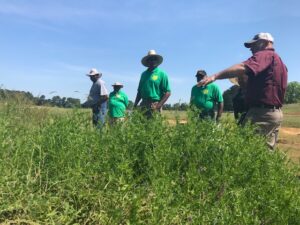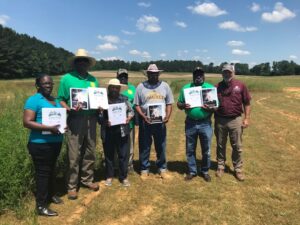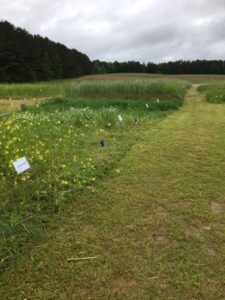Final report for ES17-132
Project Information
Mississippi producers of row crops, sweetpotato and vegetables have been reluctant to use cover crops. Reluctance continues even with substantial evidence concluding cover crops can reduce soil compaction and erosion while scavenging nutrients, improving tilth and aggregation, capture N and improve soil health. Producers often do not quantify the long-term benefits to justify input costs for a crop they will not sell. CoverItUp is a 2-year Train-the-Trainer program to educate producers on species selection, benefits, establishment, crop termination and cash crop planting tips. This project is a joint effort between MSU Extension, USDA Natural Resources Conservation Service (NRCS), MS Agricultural & Forestry Experiment Station (MAFES), and producers. Key producers host on-farm demonstration field days. The goals of the program are to: 1) Develop a Plan-of-Work to transfer cover crop education throughout Mississippi; 2) Develop/Increase cover crop knowledge of Extension agents/NRCS staff; and 3) Increase producer awareness and utilization of cover crops suitable for MS climate. These goals are accomplished by: A) demonstration plots (individual and mixed species); B) field days held during cover crop destruction; C) fact sheets/publications and D) in-service trainings for county agents and NRCS field staff. County agents/NRCS are the primary audience who will then disseminate information and work with local producers to meet our end goals. Year 1 Field Days were held April 5 and April 12 with attendance being: Extension (30), NRCS (19) and Producers (22). Desired outcomes will be measured using: A) Pre-Test/Post-Test/Surveys; B) publications; C) increased cover crop acreage in the region.
- Develop and implement a statewide Plan-of-Work program that provides county extension agents a “ready-to-use” program for conducting cover crop education. MSU Extension uses a program development process (Plan-of-Work) where Specialists develop “ready-to-use” programs for county agents to use in their county programming. There is no Plan-of-Work related to cover crops, soil health or similar areas. Cover*It*Up will use experiences, publications and input from producers to develop a program for Mississippi via our net network of Extension agents. This value-added program will give agents a ready-to-use model to use in county programming to enhance soil health. Year 1 of the project is just wrapping up, therefore, the Plan-of-Work objective has not been completed and offered to agents at this time.
- Develop and/or Increase baseline knowledge of county extension agents and NRCS field staff. Extension agents in MS know cover crops offer many benefits but most are not comfortable deciding when, where, and how they should be used. Limited knowledge prohibits agents from recommending cover crops or guiding producers in regards to sustainable agriculture practices. The Cover*It*Up program develops agent skill sets by providing information, expertise and hands-on learning. This allows agents to educate producers on cover crop benefits, guide them through the learning curve and ultimately increase producer utilization of cover crops. Field Days/In-service trainings were completed on the date of annual report deadline so analysis of Pre versus Post training knowledge levels has not been completed at this time.
- Increase producer awareness on benefits of single species and mixed species cover crops suitable for MS climate and production systems. Roughly 1/3 of attendees at Field Days were producers who indicated a significant positive change on perceptions and knowledge of cover crops however complete analysis has not been accomplished to date. The timing of Field Days did not allow proper evaluation analysis before Annual Report was due. Pre and Post evalutions were conducted and more time will allow us to adequately review the responses. Principle knowledge gained should include specie selection, soil erosion reduction, moisture management, conservation programs, nitrogen accumulation and planting/termination strategies.
Cooperators
- (Educator)
- (Educator)
- (Educator)
Education
Participants in the Train-the-Trainer program, "Cover*It*Up received 2 hours education using a classroom setting format. Four speakers discussed Water Quality, Soil Health, Nitrogen Management using Legumes, NRCS Cover Crop Selection Tool training, Seeding Rates/Expenses and Establishment/Termination Methods. Following the classroom training, participants viewed 32 demonstration plots. Plots were single-specie and multiple-specie plantings used to demonstrate growth habits. Plant roots were examined to show nodule formation, soil aggregation, root growth and earthworm activity. A roller-crimper was used in sub-plots to show the effect or lack thereof on different species and plant heights. All attendees received a 3-ring binder and a jump drive containing copies of 28 soil health and cover crop related publications.



Education & Outreach Initiatives
Conduct Train-the-Trainer field days for Extension agents and NRCS staff to increase their knowledge, understanding and usage of cover crops in Mississippi.
Four field days were conducted in spring of 2018 and 2019. Participants received 3-ring binders and jump drives with cover crop information and web links along with 2 hours of in-service training in the classroom and 2 hours in the field. Trainings in the field consisted of viewing 32 plots of single and mixed-specie cover crops followed by a crop termination demo using a roller-crimper implement. While in the field, much discussion was had regarding the many Pro's and Con's of various aspects of cover crops (pest management, erosion control, seeding rates, establishment methods, termination dates, nitrogen nodule formation, N-accumulation rates, etc).
Extension Agents, NRCS staff, consultants and producers seemed to appreciate the combination of classroom and hands-on learning.
The four field days were held in April of 2018 and 2019 with attendees being MSU Extension agents, Alcorn State Extension Agents, NRCS staff and producers. Attendees received a 3-ring binder and a jump drive loaded with cover crop publications and additional web links.
Attendees received 2 hours of classroom training and 2 hours in field plots where they viewed specie comparisons, root growth, erosion management, nitrogen nodule formation and crop termination tactics.
Program evaluations were conducted following each field day events and the combined summary of all four events may be accessed here: Evaluation-Summary-CoverItUp_all3locations.docx_.pdf
Extension agent and producer response was highly positive and indicated a significantly high retention rate of material covered. Since conducting the project,the PI has seen a large increase in both producer and Agent requests for help in selecting cover crop mixes and stand establishment. Overall, the program seems to have had a positive impact in cover crop usage and comfort level in using various cover crops.
Three Extension publications were developed during the project:
Cover Crops: Benefits and Limitations. 2019. Mississippi State University Extension, P3330. http://extension.msstate.edu/publications/cover-crops-benefits-and-limitations
Cover Crops: Establishment and Termination Guide. 2020. Mississippi State University Extension, P3417. http://extension.msstate.edu/publications/cover-crops-establishment-and-termination-guide
Cover Crops: Seeding Rates and Planting Depths for Cool-Season Species. 2020. Mississippi State University Extension, 3425. http://extension.msstate.edu/publications/cover-crops-seeding-rates-and-planting-depths-for-cool-season-species
Educational & Outreach Activities
Participation summary:
Learning Outcomes
Project Outcomes
Short-term outcomes for this project include approximately 104 field day attendees. These were a combination of Extension agents, NRCS, FSA, producers and ag consultants. Field days were well attended and attendees indicated the format of classroom training followed by field training was beneficial and each type training reinforced the other.
Program evaluations at the conclusion of each field day demonstrated a high level of education and willingness to initiate and/or increase usage of cover crops to protect soils. The Pre/Post evaluation also indicated that producers with high value crops are more likely to invest in cover crops.
Three Extension publications on cover crops were developed and published using the PI's project experiences to guide the direction of publications. These publications are written in an easy-to-comprehend style to be more useful to producers and ranchers. Publications are available in print and online on the Mississippi State University Extension webpage, MSUCares.com.
Following each field day, the PI received in increase in requests for cover crop information and farm visit support. PI is please with overall success and direction of cover crop usage in Mississippi.
Many publications that provide cover crop planting rates seem to be on the high/excessive side in PI's opinion. Most recommendations in MS are only ~60% of many published rates. This is of course dependent on specie, planting date and planting method.


